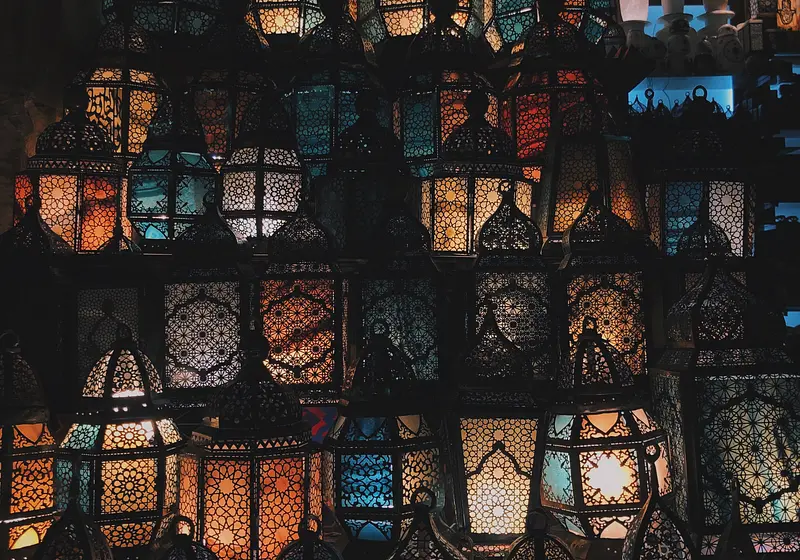You might have heard that Muslims fast during the month of Ramadan, which begins on April 12-13 this year, but Ramadan isn't just about fasting. This article digests everything about Ramadan from its significance and meaning to its practices and beauty.
Let us slide into your dms 🥰
Get notified of top trending articles like this one every week! (we won't spam you)What Is Ramadan?
First of all, what is Ramadan, and what does it mean? Ramadan is a time of spiritual reflection, self-improvement, discipline, and heightened devotion and worship. It is the ninth month of the Muslim calendar, and it begins and ends with the appearance of the crescent moon.
During this month, able-bodied Muslim adults and older adolescents abstain from food and drinks (yes, even water) from Fajr prayer (dawn) till Maghreb prayer (dusk). Pregnant or nursing women, women on their periods, children, the old, the weak, the sick, travelers on long journeys, and the mentally ill are all exempt from the requirement of fasting. For these exceptions, extra fasting days may be substituted after Ramadan ends. Volunteering, performing righteous works, or feeding the poor can be substituted for fasting if necessary.
You might have already heard that Muslims fast during the month of Ramadan, but Ramadan isn't just about not eating. Ramadan is generally about abstaining from all forms of sins including lying, sexual activity, immoral deeds or intentions, harm to people, violation of other people’s rights, or any distracting life pleasures.
During Ramadan, Muslims focus on being closer to God by reading the Quran more regularly or praying extra prayers at night, known as Taraweeh prayers. Doing good and being kind to others is also a part of being closer to Allah like participating in charity, spreading happiness, helping others, feeding the poor, or even smiling at each other’s faces.

Take the Quiz: Which Generation Matches Your Personality?
Discover the generation you truly belong to!
Significance
You might be wondering what it is that makes Muslims extremely devoted to this month especially. Well, first of all, fasting during Ramadan is one of the five pillars of Islam, so it is obligatory for able-bodied Muslims. Fasting is important in Islam because it is a way for people to overcome their lust and desires within a reasonable limit so that one can control oneself and prevent becoming a slave to his/her appetites.
Moreover, in Islam, it is believed that it was during Ramadan, on the “Night of Power” (Laylat al-Qadr), that God revealed to Prophet Muhammad the Quran, Islam's holy book, “as a guidance for the people.” It is also mentioned in the Quran that this night is better than a thousand months. That means that worshipping God on this night is better or is worth more than worshipping Him for a thousand months. Besides, those who observe the holy month with fasting, prayer, and faithful purpose have their past sins forgiven by God.
On a personal level though, Ramadan teaches a lot of beautiful lessons that lead to self-growth and development. A few of the most important lessons include:
How to develop our manners and moral fortitude.
How to treat our fellow human beings with respect
How to develop financial discipline and cleanse yourself of bad financial habits.
How to maintain self-control and sacrifice, while shielding our souls from greed and immorality.
How we can improve our connection with the Almighty.
How unity and equality is achieved regardless of race, religion, or social status
How no one has ever become poor by giving.
But, most importantly, the month of Ramadan cultivates in us a sense of compassion. It encourages us to empathize with those who are less fortunate, to feel and understand the hunger and thirst that poorer people, who always involuntarily go without food and water, go through every day.
Is It Healthy?
Among many of the arguments regarding fasting, probably one of the most asked questions is if it’s healthy for the body. The answer is yes; fasting is scientifically proven to have many benefits for the human body. Here are some of them:
Promoting Blood Sugar Control by Reducing Insulin Resistance
Fighting Inflammation
Improving Blood Pressure
Boosting Brain Function and Prevent Neurodegenerative Disorders
Aids Weight Loss
Boosting Metabolism
Delaying Aging and Extending Longevity
Regenerating Immune System
Detoxify Body
Reducing the Risk of Heart Disease by Reducing Bad Cholesterol Levels in the Blood Stream and Increasing "good" Cholesterol Levels
Boosting the Cancer-Curing Effects of Chemotherapy
Despite its long list of health advantages, it might not be appropriate for everyone. If you have diabetes or have low blood sugar, fasting can cause dangerous fluctuation in your blood sugar levels. Because of that, God gave people with health issues the license to not fast.
Customs And Traditions
When it comes to Ramadan, Muslims have their way to make it special. Some customs and traditions are tailored for Ramadan. Though many of these traditions are performed by all Muslims, I’ll be describing a typical Ramadan day as a Muslim in Egypt.
Before Ramadan starts, the streets and houses get enchanted with bright colorful lights and Ramadan-themed decorations. Lanterns, being the most iconic symbol of Ramadan, are hung in houses, stores, and restaurants. They come in an innumerable variety of designs and sizes.
Then, Ramadan officially starts. The day begins with suhoor, the meal that is eaten before Muslims begin to fast. Families gather before dusk usually at home or sometimes out to a restaurant offering suhoor meals, often awaken by a “Mesaharaty”, a person who plays the flute or drums to wake people up to eat.
Fruits and vegetables with a lot of water percentage, like cucumber or watermelon, are most commonly eaten. Yogurt is also essential for many people for suhoor. The beauty of suhoor is knowing that everyone else is awake at this late hour, sharing the same experience.
When it’s almost time for breaking the fast, you are greeted by genial strangers on the streets who offer free food, drinks, water, or dates as an act of kindness for others to break their fast. Then when sunset finally arrives, people gather with their friends or family members to break their fast and have a feast. The fast is usually broken by eating dates, as this is what Prophet Mohamed PBUH used to do. After eating some dates, people dive into the food, which tastes more delicious than ever!
A few hours after eating, special Ramadan desserts are made and distributed among neighbors to spread joy and strengthen ties. Later at night, people start focusing on their personal worship and religious practices until it’s time for suhoor again.
Eid Al-Fitr
After a month of Ramadan, Muslims celebrate their first holiday, Eid Al Fitr, which comes right after the last day of Ramadan and lasts for 3 days. During this holiday, families and friends gather and celebrate by wearing their most beautiful clothes and having a huge feast. People also bake special Eid pastries together, and they exchange gifts or money, which is something we all look forward to :). However, probably the most important part of Eid Al-Fitr is distributing meat for the poor as a charity so that they can enjoy Eid as well.
How To Support Your Muslim Friends
If you have Muslim friends who you want to support and make them feel the delight of this month, here are some things you could do:
Don’t act in disbelief when they tell you they can’t eat nor drink. It’s pretty normal for Muslims and is not a big deal.
Don’t feel guilty when eating around a fasting person, it’s totally fine.
Don’t offer food or water as an act of “sympathy”.
Consider joining them for iftar, or their breakfast
Consider offering charity to join the Ramadan spirit
Send them “Ramadan Mubarak” wishes at the beginning of Ramadan
No matter how much I can try to describe it, I could never deliver the genuine happiness that is felt during this holy month, a bliss that transcends all the struggles and efforts exerted during this period. However, I hope now you can tell, to a certain limit, why Ramadan is cherished by Muslims so much. It is instantly missed after it ends and is always awaited throughout the rest of the year. Ramadan Mubarak everyone <3














